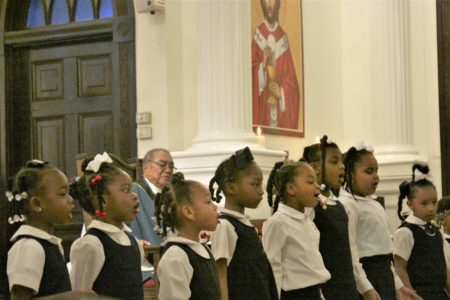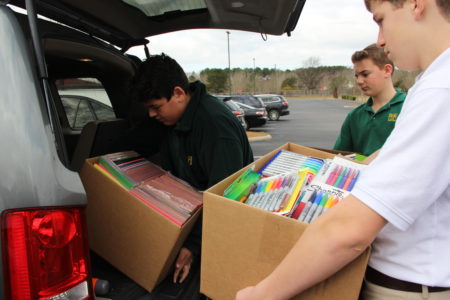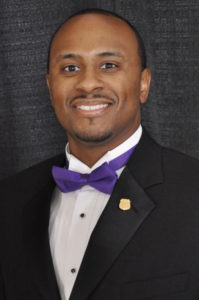By Carol Zimmermann
WASHINGTON – People often talk about giving up something for Lent such as candy, soda or more recently, social media, while some commit to doing something extra including praying more, reading spiritual works or helping others.
And, it turns out, many do both.
This reporter conducted an unofficial poll Feb. 12 on Twitter where 57 percent of respondents said they planned to do something extra and 43 percent said they would give something up for Lent. But without the added option to do both, a few Twitter respondents commented that their true choice was a combination of the two practices for Lent’s 40 days.
“Since both\and is in the nature of the Catholic (Church) I strive for one of each,” wrote Susan Timoney, secretary for pastoral ministry in the Washington Archdiocese.
Father Mario Amore, associate pastor at Our Lady of Sorrows Parish in Farmington, Michigan, said the two ways to observe Lent really go hand in hand.
“We should be going beyond ourselves out of love to lend a helping hand, be an encouragement or assist others with the necessities of life. We should also be going out of our way to fast from something that we really like,” he said in an email.
The priest said that by fasting, the “physical craving or longing for a certain food might give us just a small glimpse of our longing for God, and even more, God’s longing for us.”
Paulist Sister Theresa Aletheia Noble, who is an editor for Pauline Books and Media in Boston and also attends school part time at Boston College, similarly is a fan of giving up and doing something extra during Lent.
“People may not like to hear this, but I think Lent is a good time to do both,” she said.
The religious sister said when people give something up, it often leaves either time or an emotional void which should be filled with something positive.
“For example, if I give up social media, I might also plan to use the extra time to read a spiritual book during the Lenten season,” she told Catholic News Service.
But she also said she doesn’t just randomly pick something to do or go without.
“I always bring my ideas to the Lord in prayer and ask him to guide me in my Lenten practices to ensure that they center on God and not on my personal plans for self-improvement,” she said.
Bishop Frank J. Caggiano of Bridgeport, Connecticut, asked his Twitter followers what they were giving up for Lent or doing as a spiritual work. He also asked if there was a way they could do both.
In another tweet, he said he had decided not to choose between the two practices this Lent but to do both “in the hope that the Lord, in his mercy, will grant me an ever greater personal renewal of faith, hope and charity.”
For his combined Lenten effort, he said he was going to give up one hour of his day for increased prayer, beyond his normal prayer routine, which he said “will be hard to maintain but long overdue. To spend the hour with the Lord is a spiritual work beyond price.”
For those who choose one practice or the other, the choice is often thought through and not just made arbitrarily.
Tom Breen, a parishioner at St. James Parish in Manchester, Connecticut, who works in the communications office at the University of Connecticut, said he prefers to give something up for Lent because as he put it: “There are a lot of things that clutter up my life and make it hard to have the kind of focus that’s desirable for a Christian.”
He responded to CNS through Twitter – before Lent started – and pointed out the irony that he was giving up Twitter for Lent. He said he typically checks the social media platform “probably two dozen times a day” noting that it sometimes comes in handy for work but is “mostly a distraction.”
He said reading Twitter can prompt “extremely uncharitable thoughts” so he hopes that giving it up can create more time and room “for serious thought and genuine reflection” and maybe make him realize at the end of the 40 days that he didn’t need it so much after all.
Sister Theresa said she planned to give up social media in some form during Lent, noting that “it’s a good idea to give up anything that has begun to take over our lives and draw us away from the Lord.”
Another option, she said, is not to give up social media completely but to “participate in a more limited manner, or to post more spiritual and uplifting things.”
Others, like Mary Jean Duran from Lafayette, California, are more on board with doing something extra for Lent, provided it is done with others, in the culture of “encounter” that Pope Francis often mentions.
Duran, a parishioner at St. Mary of the Immaculate Conception in Walnut Creek, who volunteers with adult faith formation and the monthly doughnuts ministry, said she plans to pray more during Lent.
“But what makes prayers like the rosary and stations even more authentic for me,” she said in an email, “is praying them in church, with my parish community, including that one guy that always manages to irritate, yet here we are, offering up our prayers together. Powerful.” (Follow Zimmermann on Twitter: @carolmaczim)
Updates
Catholic School Week at Holy Family, Natchez

NATCHEZ – Holy Family Early Learning Center’s four and five year old students sing the offertory hymn at Mass Sunday January 28, to kick off the week. (Photo by Valencia Hall)
Catholic School Week at Cathedral School, Natchez
Catholic School Week at St. Patrick, Meridian
Catholic School Week at St. Anthony, Madison

MADISON – St. Anthony ,sixth grade students Joe Koury, Emile Picarella, and Lockard Williams load art supplies collected by St. Anthony students to support Art and STEM education at Plantersville Middle School as a Catholic Schools Week service project.(Photo by Stephanie Brown)
Catholic School Week at St. Richard, Jackson
Catholic School Week at St. Joseph, Greenville
Catholic School Week at Annunciation, Columbus
Diocesan youth ‘Ablaze’ with faith after convention
By Maureen Smith
VICKSBURG – More than 100 young people from across the Diocese of Jackson spent the weekend of Feb. 3-4 getting fired up about their Catholic faith at the diocesan youth conference. The theme of the conference, Ablaze, came from the weekend itself. Coordinator for Youth Ministry Abbey Schuhmann told the Vicksburg Press that when she and her planning committee set the conference for the weekend of the Presentation of the Lord, the theme fell into place.
“The feast represents our baptism and how at our baptism we are presented with a candle as the symbol of the light of Christ. We have that responsibility as baptized Christians to spread the light of Christ. So the theme Ablaze came about,” Schuhmann told the Post.
Catholic singer and songwriter PJ Anderson gave the keynote talks concert-style. “My favorite part was when they were playing the music and we got to go in front of the stage and dance with everyone,” said Mina Leffler of Jackson St. Richard Parish. She and fellow parishioner Jordan Muse said Anderson encouraged the teens to be compassionate. “The message I heard is that you should be nice to everyone and not judge anyone because God’s always listening and you don’t know what they are going through,” said Muse.
Dayonnia Conway came with two other members of Camden Sacred Heart. She also loved the music and appreciated the effort to build her faith. She would encourage other youth to come to the next convention “Anything involving God is good and they are trying to build your relationship with God.”
Father Rusty Vincent and Jeff Cook led breakout sessions for the youth. Christopher Johnson with Natchez St. Mary Basilica said the breakouts gave him some food for thought. “I learned that I should follow God and listen to his calling because everyone has a calling,” said Johnson.
Mia Gamberi, also from St. Mary, enjoyed when Anderson related his talk to real-life situations. “He related sports and faith life and that you can have a balance. You don’t have to be boring, you can still have a life and it can be faith-based,” she said.
In addition to Mass, the kids had the opportunity for Reconciliation, adoration, a candlelight procession and blessing and the blessing of the throats for the feast of St. Blaise. Seminarians Mark Shoffner and Andrew Bowden attended the whole weekend. Other seminarians came for the closing Mass celebrated by Bishop Joseph Kopacz. Shoffner said he was glad the students got to participate in other kinds of sacraments and liturgy to see the rich prayer life of the church.
Deacon Jeff Artigues brought his youth group from Starkville St. Joseph Parish. He said Anderson even used the symbol of light to relate the conference theme to actions the teens can take.
“Something that stuck out when PJ told his story about when his wife was in the hospital. When his wife told her version of the story, she said she saw his light go out. I thought about our kids and we talked about it in our small group. We need to see our own light and take care of it. Sometimes we don’t have great perspective on ourselves and maybe we don’t see other people and their lights, but we can be that person carrying a light – if it’s helping a friend with depression or lack of faith or whatever it may be. If you are a true friend you can say to your friend, you don’t need to be doing those things or maybe light that light for them,” said Deacon Artigues.
He said he enjoys these conferences both for the faith-building and the friend-building, saying he hopes the teens will make friends they may see again in college where they can continue to support one another on their faith journeys.
Lawmakers, Catholics can do more for state, nation

Will Jemison
Black History Month
By Will Jemison
As we celebrate the contributions of Black folk in this country during Black History Month, I pause to consider how much further we as a nation could be if we were to ever use the influence of our Catholic faith and teachings for more than one or two issues. We currently live in a state that consistently votes against its own interests for nearly every statewide or federal election, yet we wonder why our roads continually are in disrepair, our public education system is historically at the bottom of every scholastic poll and we remain at the top of nearly every health disparity list in the country.
We as Catholics have done an amazing job fighting for the rights of the unborn for decades, yet when it comes to fighting for quality of life for those after birth, we have much more work to do. The failures of many of our elected officials is a mirror-image of what our nation has become. In the past year, America has gone from being an example of hope, prosperity and possibility to precisely what President Donald Trump described Haiti, El Salvador and all the African continent as in recent weeks, a “toilet” country.
Despite his remarks on these black and brown countries, many of which have large populations of our Catholic brothers and sisters, more knowledgeable people are aware of how many of those “toilet” countries have contributed greatly to this country and how our country used prejudicial policies to ensure those same countries remained under-developed.
Haitian soldiers were among the first international supporters of the American Revolution, sending hundreds of men to Savannah, Georgia to fight for America against the British. The Haitian men fought valiantly and in return, just as it’s done for centuries, America failed to acknowledge their contributions and then relegated them to second-class citizenship after the war and later refused to acknowledge the newly formed Haitian government upon its independence from France.
Meanwhile, while our own government survives off temporary spending bills and questionable leadership, several of these countries in Africa are continuing to advance an agenda of progress spearheaded by their respective governments. The nation of Rwanda is set to effectively eliminate cervical cancer within its borders by 2020. Sierra Leone provides free prenatal care for pregnant women and children younger than five years of age. In all, sub-Saharan African immigrants to the United States are ranked among the most educated, with nearly 40 percent of them holding a college degree, compared to just 30 percent of American-born individuals.
After he chose to use such vile and egregious language, the president said he longs for more immigrants from Nordic countries such as Norway. What he consistently fails to realize is Norway and several other industrialized nations long ago concluded for reasons of economic prosperity, social cohesion, productivity and humanity to implement a social safety net and basic access to health care that the president and his party comrades have opposed from the New Deal to the Affordable Care Act.
Sadly, President Trump isn’t alone in his racist rhetoric and certainly falls in line with a great many “good” Christians in this state who’ve upheld Jim Crow era segregationist policies for generations. We don’t have to look further than our own state capital and our legislators who recently voted to end adequate funding for K-12 education throughout Mississippi and considered a bill (SB #2175) that would have ended Medicaid expansion throughout Mississippi at the same time our statewide Medicaid enrollment exceeds 75 percent (3 out of every 4 people) of our total state population.
Many of these same legislators in recent years have ensured little or no funding for mental health and other critical care needs for the citizens of this state. This blatant disregard for the welfare of our brothers and sisters is something that all Catholics should be concerned about. Legislation that fails to allow for the safe-keeping and general welfare of our neighbors – from all walks of life – are in direct conflict with Catholic Social Teaching.
What can you do to celebrate Black History Month? Be aware of what’s taking place in our state and our country and work to steer this ship on a much better course. Bigotry, racism and classism isn’t specific to one party, race or gender, but we all can work to right the ills of the past and keep us from repeating it.
(Will Jemison is coordinator for Black Catholic Ministry for the Diocese of Jackson)
